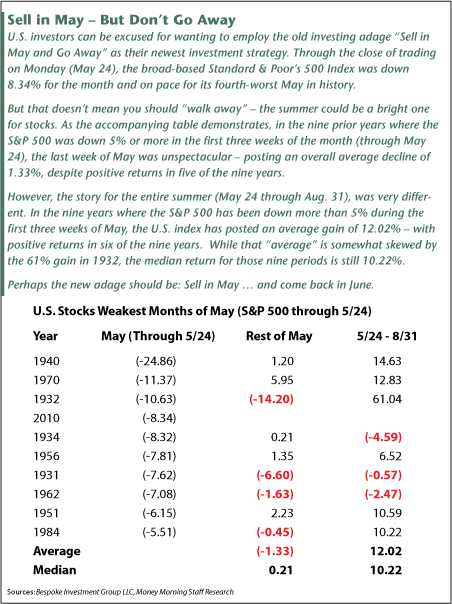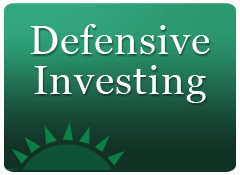If you embrace the old Wall Street adage "Sell in May and Go Away" as an investing strategy, you could end up with a bad case of the U.S. stock market summer blues, a new research study has found.
That concept is based on the notion that the May-to-November span provides a weak environment for U.S. stock market investors. According to Jon Markman, a best-selling author and contributing writer to Money Morning, that viewpoint started gaining traction in late April. And why not? The major U.S. indexes were already up a lot more than anyone expected, making that a seemingly convenient point to take profits.
Those who didn't follow that strategy probably now wish that they had.

Through the close of trading on Monday (May 24), the broad-based Standard & Poor's 500 Index was down 8.34% for the month and on pace for its fourth-worst May in history.
But is "selling in May and walking away" really the right strategy to employ at this point?
Money Morning's Markman says "No."
"Like most old market adages, there's not much substance to the concept if you take a good look at history," he said recently.
In a study released this week, Bespoke Investment Group (BIG) LLC took that look at history - the numbers support Markman's point of view.
Bespoke, a group of number-crunchers extraordinaire, found that there were nine prior Mays in which the S&P 500 was down 5% or more in the first three weeks of the month (through May 24). In those nine years, on average, the last week of May was unspectacular - posting an overall average decline of 1.33%, despite positive returns in that last week in five of the nine years.
However, the story for the entire summer (May 24 through Aug. 31) was very different, indeed. In the nine years where the S&P 500 has been down more than 5% during the first three weeks of May, the broad-based U.S. index posted a hefty average gain of 12.02% - with positive returns in six of the nine years. While that "average" is somewhat skewed by the 61% gain in 1932, the median return for those nine periods is still 10.22%, Bespoke researchers found.
From a historic standpoint, the numbers "make sense," says Money Morning Chief Investment Strategist Keith Fitz-Gerald. But the market outlook for the summer of 2010 is going to depend on several key factors - and the biggest factor is beyond U.S. control.
Stock Market Wild Cards
U.S. stocks have sold off as investment managers trim "risky" assets from their portfolios. And they may not be finished, yet.
Investors are closely watching the Eurozone debt crisis, fearing that it could represent the beginning of a worldwide financial contagion akin to the subprime debacle of 2008.
The so-called "PIIGS" - the European nations of Portugal, Ireland, Italy, Greece and Spain - have seen their own stock markets fall so much that they are now officially back in bear market territory.
LIBOR (London Interbank Offered Rate) - the rate that banks charge each other for short-term loans in U.S. dollars - hit another 10-month high yesterday (Tuesday), which underscores the growing fear investors have that Europe's sovereign debt crisis could explode into a full-fledged banking crisis, crimping credit enough to send stocks into a deathspin.
The backdrop isn't all bad, Money Morning's Fitz-Gerald notes. There's a tremendous amount of capital on the sidelines: As of May 16, there was still $2.878 trillion sitting in money market mutual funds, according to the Investment Company Institute, with slightly less than $1 trillion of that in retail money market funds.
If just the retail investors opted to shift back into stocks, that flow of capital could ignite a powerful rally, Charles Rotblut, vice president of the American Association of Individual Investors, told CNNMoney.com.
"We're seeing that investors want to believe in the recovery and improvement in corporate profits, but are still not yet ready to jump back in when they're still very concerned about jobs and housing," Rotblut said.
So whether U.S. stocks turn in the kind of strong summer performance presaged by the Bespoke report will have a lot to do with liquidity.
"On just about any level [Bespoke's research] makes sense," Money Morning's Fitz-Gerald said. "There's a tremendous amount of capital sitting on the sidelines if the European contagion eases enough to let capital flow back into the market. But the credit markets will have a lot to say about any trend: If the credit markets remain 'pinched,' then this will more likely be a summer bummer" than a summer surge.
The Best Defense...
According to Money Morning's Markman, the escalating fear of a Eurozone debt contagion is causing a significant shift to take place in the global stock-and-bond markets.

"Once the euro crisis settles down, my expectation is that a lot of this money will start seeking out high-quality, high-dividend stocks in the utility and industrial sectors - as well as the bond-like real estate investment trusts (REITs) and master limited partnerships. We're positioned for this in our Strategic Advantage advisory service," Markman said. "It's worth making sure that you are correctly positioned, too."
Veteran analysts like Barry Knapp at Barclays Capital (NYSE ADR: BCS) believe that means that the strategies that have worked well over the last 14 months - focusing on high-beta, early cyclical stocks - will start underperforming. Knapp is telling clients to focus next on higher-quality cyclicals that have attractive valuations, particularly industrial and tech manufacturers.
Knapp also likes attractively priced defensives such as telecom, utilities, and healthcare.
Concludes Markman: "I think his point of focusing on high-quality, dividend-paying cyclicals and economically sensitive defensive stocks is the way to go over the next few months. Some choices are aerospace, energy master limited partnerships (MLPs) and foodmakers - and not the large-cap bank or energy stocks that make up a large portion of the major market indexes."
To paraphrase Bespoke: Perhaps the new adage should be: Sell in May ... and come back in June.
News and Related Story Links:
- Money Morning Market Commentary:
Should Investors Sell in May and Go Away, or Ride the Bull Awhile Longer? - Money Morning Week Ahead Column:
Stocks - Led by Apple Inc. - On a Hot Bull Run No Investor Should Miss - Money Morning Defensive Investing Series (Part II):
Why the Eurozone Debt Contagion is Telling Us That It's Time to Buy Dividend Stocks, REITS and MLPs - Bespoke Investment Group LLC:
Official Website - MarketWatch.com:
Southern Europe markets all in bear market territory - MarketWatch.com:
Libor rise underscores rising market tensions - CNNMoney.com:
Stocks: $2.9 trillion on the sidelines
About the Author
Before he moved into the investment-research business in 2005, William (Bill) Patalon III spent 22 years as an award-winning financial reporter, columnist, and editor. Today he is the Executive Editor and Senior Research Analyst for Money Morning at Money Map Press.



